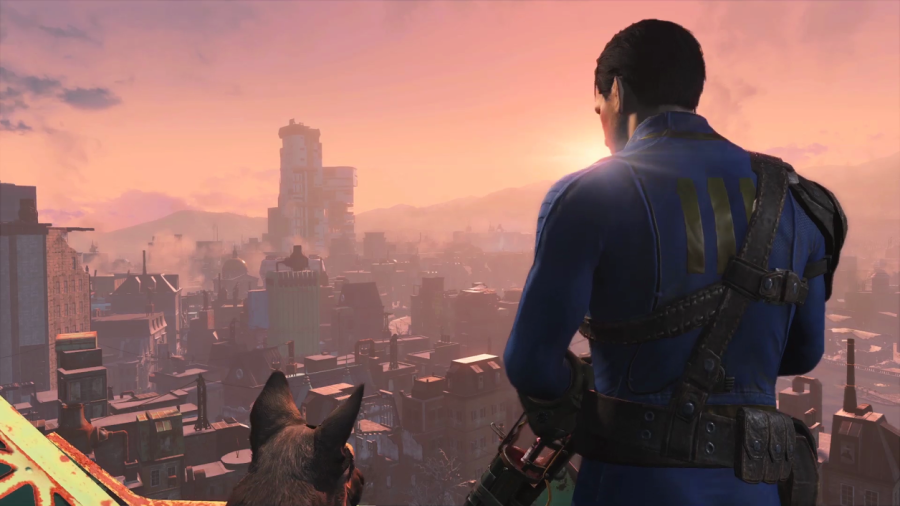Despite glitches, Fallout 4 lives up to the hype
This is to those who are no stranger to poor posture, carpel tunnel, and few hours of sleep. Amidst strained eyes and enabling procrastination, we find the holy grail of quality gaming. This is the not-so-patiently awaited Fallout 4.
In 2004, Bethesda Softworks acquired the license to the Fallout franchise; then, on October 28, 2008, they released Fallout 3 to critical acclaim. Fallout 3 established the Bethesda Fallout games as the open world, first/third person RPG juggernauts that they are today. Now, they are following up their AAA franchise with the release of Fallout 4 on November 10.
The Fallout universe is built around the idea of a nuclear war occurring between China and the United States over the shortage of petroleum reserves that run their economies. 200 years later, Fallout 4 takes place in which a protagonist departs from Vault 111: one of many retreats for citizens to escape in the event of nuclear warfare.
After leaving the vault, the protagonist is met with the post-apocalyptic wasteland of Boston, Massachusetts, now known as “The Commonwealth.” Here, famous land marks have taken on new life. For example, Fenway Park is now called Diamond City: a settlement for war refugees.
Not straying far from Fallout tradition, this wasteland is free for the player to explore and complete quests, leveling up and acquiring new perks along the way. There are enemies to fight, items to obtain, locations to explore, people to meet, and – something new to the Fallout franchise – the ability to leave a mark on The Commonwealth by building settlements. As is the hallmark of Bethesda’s Fallout games, the player has the ability to choose when they do them, or if they even want to do them at all.
While war never changes, as every intro to a Fallout games states, the engine finally has. The most recent Fallout games (Fallout 3 and Fallout: New Vegas) have used the Gamebryo Engine, which has been used in both Elder Scrolls: Oblivion and Elder Scrolls: Morrowind. The old engine has worked solidly and has aged well, but the stiffness of the gameplay isn’t suited for modern role playing games.
Fallout 4 is now running on the Creation Engine, first featured in Elder Scrolls: Skyrim back in 2011. It has much more flexible gameplay and combat mechanics, better graphics, more interactivity in the game world, and actual in-game weather physics.
The map size for Fallout 4 is huge and is even bigger than Skyrim, which was basically the size of a whole nation. It took one person who got the game early (lucky sod) 15 minutes just to walk across the map. If he had explored every nook and cranny in the map, it would have probably taken even longer. Every village, military base, and ancient ruin has fun battles and unique items to add to the gamer’s inventory or sell for a decent price. There are also really cool stories that add to the games’ background and plot.
The creation system, both characters and crafting, is also severely improved compared to the last two games. Players have their SPECIAL attributes (Strength, Perception, Endurance, Charisma, Intelligence, Agility, and Luck) that affect their abilities in the game in areas such as combat, diplomacy, tech and survival skills.
The appearance of the protagonist(s) is customizable to the point of being ridiculous. Seriously, everything from the hair to the width of the avatar’s cheeks is customizable, and it is entirely possible to spend 20 minutes just trying to make the character look spiffy.
The player can also create entire towns with metals and supplies that are found in the game world, with inhabitants and a system to transport those goods from one town to another. The player also works to protect the goods from bandits and radioactive monstrosities with fully customizable weapons and a combat system that is much more fleshed out and fun compared to other first-person combat games of recent years.
Speaking of weapon customization, the tools of destruction can be changed innumerably. From adding barbed wire to a baseball bat to adding rapid fire to a BB Gun, the details are superb and much more in depth than need be, but it’s really entertaining and the player can waste plenty of time creating the perfect town, weapon, or armor (yes, armor is customizable as well, and it’s almost as detailed as the village or weapon customization).
The narrative experience in this game has also received a large upgrade with male and female voice actors for the protagonist(s) that provides more cinematic detail, which is a first. Both voice actors, Brian T. Delaney and Courtney Taylor, do an excellent job in their roles and actually sound like they have more than one emotion. The character interaction has taken an approach similar to this year’s gaming masterpiece
The Witcher 3: Wild Hunt, with more emphasis on character development and actually adding depth similar to a great novel or movie.
As amazing as this game is, it’s not perfect by any stretch of the imagination. Bethesda knows how to craft excellent games, but they are notorious for having glitches, insanely long loading times, as well as other technical problems, and Fallout 4 is no exception. There have been times where the game crashed or where the framerate (basically the speed at which it runs) drops to the point of being slower than a turtle trapped in quicksand. These problems are currently being worked on, so they should either be fixed soon or at least toned down to the point of being almost unnoticeable.
Fallout 4 is a game that appeals to all audiences, from those who love to vaporize bad guys to those who like to loot and plunder. It is probably the most hyped game of this year, and current reviews are better than expected. Not only is Fallout 4 living up to expectations but is surpassing them in spades. It’s atmospheric, lovely to look at, and above all, it’s fun; frankly, that’s all everyone really wants.










